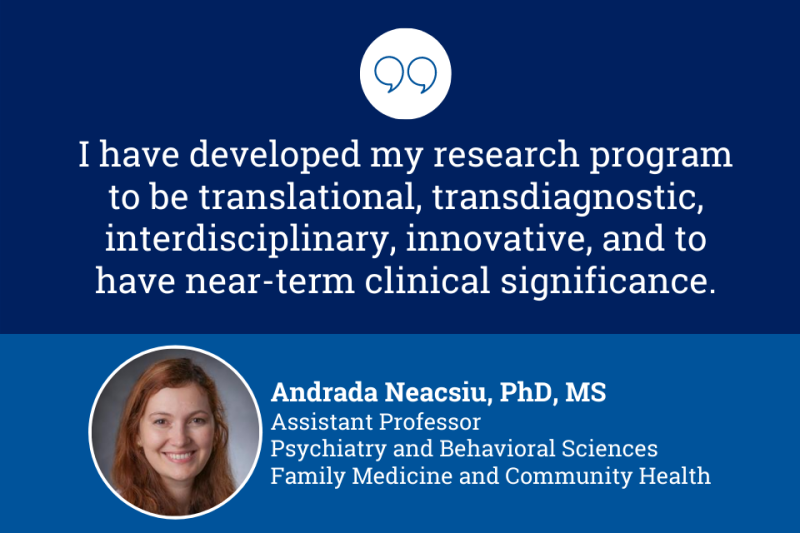
Assistant professor Andrada Neacsiu, PhD, MS, recently joined the Department of Family Medicine & Community Health as a behaviorist working with the Duke Family Medicine Residency Program. The Department of Family Medicine & Community Health published the following Q&A with Neacsiu, who will continue to hold a primary appointment in Duke Psychiatry & Behavioral Sciences. Read on to learn more about her background and her passions.
Why did you choose to join the faculty in the Department of Family Medicine & Community Health?
One of my greatest joys as a clinical psychologist is to help providers be the best versions of themselves. I believe that by helping providers improve their skills and their own well-being we can enhance the quality and quantity of care that we can provide to our patients. I am enthusiastic to join a department that values their community of providers as much as they value their patients, especially within the context of current events. I also have a research interest in developing interventions for mental health problems within primary care. I am therefore looking forward to learning from faculty and trainees in the department about how mental health services could be enhanced within a family medicine framework.
Where were you working prior to taking this role?
I came to Duke as a clinical associate in 2012 and was promoted in 2015 to assistant professor within the Department of Psychiatry and Behavioral Sciences. I will continue to hold an appointment in psychiatry in addition to my secondary appointment in family medicine and community health. My work at Duke so far included research on treatment development for transdiagnostic difficulties with emotions and education in the implementation of evidence-based treatments for psychology and psychiatry residents.
What is your approach to mentorship/teaching?
I enjoy guiding learners in their scientific and personal life choices through helping them discover and achieve what is important for them. To this end, I regularly assess my learners’ goals and their progress towards them. I offer feedback on performance as related to their goals and on what they might want to consider or might not have thought about. I encourage learners to take paths that, in my assessment, would clarify their goals and I provide them with opportunities to take those paths. I tend to be direct, matter-of-fact, and value behavioral specificity when I mentor others. In my teaching, I aim to establish a connection between my audience and the material I am presenting. I emphasize the importance of science in understanding psychological processes. Thus, I present information grounded in research and highlight the importance of weighing facts on research support. I believe that teaching makes for best learning and therefore I strive to give learners opportunities to experience and directly teach relevant constructs. Last, I believe learning should be predictable and interesting. Therefore, I strive for clarity in objectives, requirements, and learning goals while finding elements such as stories and activities that can make learning engaging and fun.
What are your research interests?
Successful control over emotions is key for psychological well-being. Therefore, my overarching research aim is to create the next generation of behavioral interventions for difficulties managing emotions. I have actively pursued this interest in four major research areas: 1) mechanisms of change in treatment for emotional dysregulation; 2) identifying novel targets for psychosocial interventions; 3) treatment optimization with mobile technology and virtual reality; and 4) neuroscience-informed treatment development. To maximize my research findings, I have used advanced quantitative methods and novel technologies (e.g., brain stimulation, virtual reality). In addition, I have developed my research program to be translational, transdiagnostic, interdisciplinary, innovative, and to have near-term clinical significance. These organizational principles guide my emerging research plan that aims to boost effective mechanisms of change with the help of innovative technologies.
Are there any major research grants you have been a part of or are currently working on?
I have completed and am currently involved in several funded research projects. With the help of a NARSAD Young Investigator Award, Duke PRIDe Award, and CTSA KL2 award, I have developed a novel, one time intervention that combines neurostimulaiton and behavioral skills training for transdiagnostic emotional dysregulation. The intervention has positive short term effects and we are currently working on refining it to lead to longer lasting behavioral change. I am also in the process of starting an experimental investigation of neural targets that are relevant in treating misophonia, a largely underdiagnosed condition that involves intense emotional and physiological reactions to specific, everyday sounds. A secondary aim for the grant is to differentiate misophonia from clinical emotional dysregulation. This project has been funded by the REAM foundation and will be conducted in collaboration with the Duke Center for Misophonia and Emotion Regulation. In my training I have also been involved in research grants that examined interventions for suicide, personality disorders, and opiate use disorder. I am hoping to expand my research program to continue to examine interventions for these problems in the future.
Is there any other information you would like to share?
I am originally from Romania and am a first generation immigrant to the United States. I am also the president for the International Society for the Improvement and Teaching of Dialectical Behavior Therapy (DBT) and an international trainer for DBT, a treatment developed for Borderline Personality Disorder and suicidal adults and adolescents. I love dinner parties, disaster movies, hiking trails, swimming in the ocean, cats, and building puzzles and LEGOs with my family.
This article was originally published on the Department of Family Medicine & Community Health website.